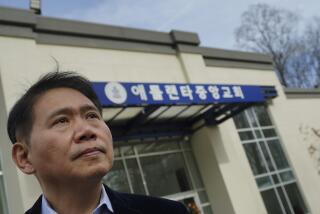Attack on Muslim Official in France Escalates Tensions Over Integration
Political tensions over Islam, integration and extremism in France worsened Monday in the aftermath of a bomb attack targeting the nation’s first Muslim immigrant to become a regional administrator.
French leaders condemned the bombing in Nantes that destroyed the parked car of Aissa Dermouche, an Algerian-born, 57-year-old educator who last week was appointed to the coveted post of regional prefect. No one was hurt in the attack early Sunday. Investigators said the most likely culprits were far-right extremists or Islamic fundamentalists.
The attack fed an edgy political mood on a weekend when Muslims across France marched to protest a proposed law that would ban girls from wearing Islamic head scarves in school.
The bombers apparently singled out Dermouche because he is a potent symbol: The government portrays his breakthrough appointment as a model of the French approach to assimilating minorities based on merit rather than affirmative action-style criteria.
“The attack of which he was a victim was particularly odious,” said Interior Minister Nicolas Sarkozy, who had a private meeting with Dermouche after a gathering of prefects that had been scheduled before the bombing. Sarkozy said Dermouche “gives our public administrative leadership a sentiment of diversity that is absolutely indispensable.”
With March regional elections approaching, the debate over head scarves has turned up the heat on a simmering brew of issues tied to the effort to integrate Europe’s largest Muslim population, which is mainly of North African origin.
The Islamic community in France is divided over the campaign to eliminate religious symbols from schools, an official response to fears that fundamen- talist Muslims are denying basic rights to women and endangering the country’s secular tradition.
Muslim groups aligned with President Jacques Chirac’s center-right administration back his initiative, but they are opposed by Islamic conservatives, some of whom chanted anti-Jewish slogans during the weekend marches.
Renewed conflict over immigrants and religion could strengthen the far-right National Front party in the coming elections. The National Front, which blames immigrants for crime, unemployment and other woes, upset the mainstream Socialists in the first round of last year’s presidential balloting and remains an electoral force despite its neo-fascist reputation and lack of parliamentary representation.
The predawn bombing in Nantes seemed to be more an act of intimidation than a true assassination attempt. But officials were alarmed by the targeting of a prefect, an official who controls most national government services in a territory.
Attacks on such top officials have been rare other than on the island of Corsica, an administrative region of France where a campaign of anti-state violence by separatists led to the assassination of a prefect in 1998.
“This is extremely grave,” a high-ranking law enforcement official said of the Nantes bombing. “In the French state, the prefect is the highest symbol of the republic. It is the equivalent on a regional level of an attack on the president.”
Though the attack seemed well planned, initial suspicions point to “more or less local right-wing extremists” rather than more prominent, violent Islamic groups, the law enforcement official said. As a result, specialized anti-terrorism police have not been brought in. But investigators will know more when the explosives are identified and can be compared with previous cases.
Dermouche, who has not spoken publicly about the bombing, came to France from Algeria at age 18. He has degrees in social sciences and management and, in a career dedicated to education, has been director of a well-known business school in Nantes since 1989. He and his family, who will soon move to his new assignment in the Jura region near Switzerland, have been placed under police guard at Sarkozy’s order.
More to Read
Start your day right
Sign up for Essential California for news, features and recommendations from the L.A. Times and beyond in your inbox six days a week.
You may occasionally receive promotional content from the Los Angeles Times.






